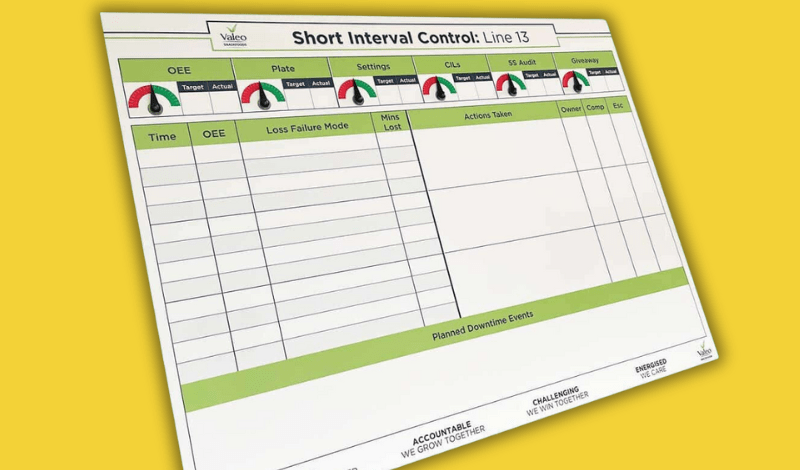
In the fast-paced world of business, productivity is key to success. The production board is one of the most effective tools for enhancing efficiency and keeping teams on track. This practical tool is a visual guide for managing tasks, tracking progress, and fostering a culture of accountability and collaboration.
This article will explore what production boards are, with examples illustrating how they can be customized and utilized across different industries. Simple in concept yet powerful in impact, production boards are more than just organizational tools; they’re catalysts for achieving goals and driving success.
What are production boards?
A production display board can range from a basic design displaying a few essential metrics to a more intricate setup showcasing a variety of metrics. This helps shop floor personnel stay informed about the progress of daily tasks in real time.
Its functionality is linked to a data source, like factory-wide monitoring software, which updates the production data. The board can present live data for companies with sophisticated monitoring systems and IIoT (Industrial Internet of Things) devices.
In such scenarios, the data is automatically gathered from various machines and systems and relayed across multiple displays throughout the shop floor.
What features do production boards offer?
Production displays offer various features to monitor and improve manufacturing processes:
- Production Rate: A key performance indicator, this feature displays the planned versus actual units produced. It often uses color coding, with units below the plan in red and those exceeding the plan in green.
- Production Efficiency: This tracks efficiency at departmental, factory, or company levels. It reflects real-time efficiency data received from device-enabled equipment.
- Takt Time: This feature compares the actual takt time against the established standard, serving as a visual motivator for teams.
- Downtime: A critical concern in manufacturing, downtime is categorized based on the system’s complexity into planned, changeover, or unplanned.
- Quality Loss: This metric indicates scrap and quality loss rates, providing insights into defect frequencies and issues specific to a shift or machine.
- On-Time Rate: This feature integrates with ERP systems for companies with advanced systems to display the on-time delivery status of active sales orders.
Production board examples
Production boards are essential in manufacturing and industrial settings, providing real-time data and daily performance metrics.
These boards vary significantly in complexity and design, catering to a facility’s specific needs. Here are some common production boards examples:
- Traditional Whiteboard: A manually updated board displaying daily targets, achieved outputs, and team assignments.
- Digital Display Board: Shows live data such as production rates, efficiency, and downtime, often integrated with factory monitoring systems.
- Interactive Touch Screen Panel: Allows real-time updates and interactions, displaying detailed analytics like takt time, quality loss, and on-time delivery rates.
How do production boards help in increasing workplace efficiency?
Production boards vary in features, with some displaying only a few key performance indicators (KPIs). In contrast, others continuously or periodically show a range of KPIs across different departments and the entire factory.
These boards enhance manufacturing efficiency in several ways:
Boosting Visibility and Productivity
By displaying daily targets and progress, these boards heighten employees’ awareness of their goals and progress, spurring them to meet or exceed production expectations and swiftly address any underperforming metrics.
Conveying Essential Information
Although many operators have access to Human-Machine Interfaces (HMIs), advanced production boards on the shop floor provide critical information that aids in making informed decisions and ensures staff are optimally positioned for efficiency.
Facilitating Better Communication
Production display boards, capable of showing metrics from various departments and the entire factory, enable managers to identify and proactively address bottlenecks.
The boards can range from large LED dot matrix displays to high-definition monitors with active screen dimensions, presenting metrics and actionable insights that help companies save time and maintain a competitive edge.
Final Thoughts
In conclusion, production display boards are invaluable assets in the manufacturing sector, bridging the gap between data collection and actionable insights.
These boards play a pivotal role in enhancing efficiency, productivity, and decision-making on the shop floor by offering a range of functionalities, from essential KPI displays to comprehensive, real-time factory-wide data.
Whether through traditional whiteboards, advanced digital displays, or interactive panels, these tools streamline communication and operational processes and empower employees at all levels. The adaptability of these boards to meet specific organizational needs underscores their importance in the ever-evolving landscape of industrial operations.
As manufacturing continues to embrace technological advancements, integrating production display boards will remain critical in driving success and maintaining a competitive edge in the market

